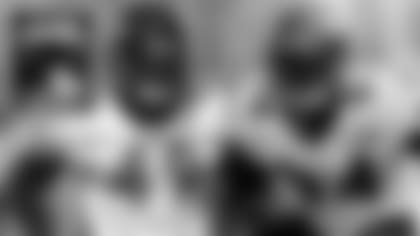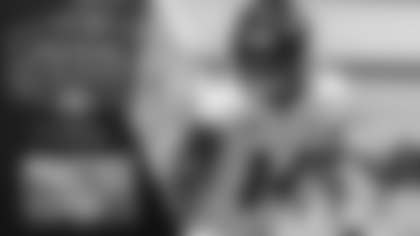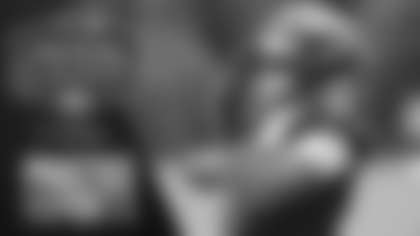The night [Sergio Kindle was drafted, he excitedly told reporters he was going to win Rookie of the Year.
That was April 23, 2010, when it looked like nothing but a bright NFL future lay ahead.
Kindle had some bumps in his college days: bar scuffles, a DWI and car crash through an apartment building. Those were behind him, he thought.
"I felt like I was going to be a star," Kindle recalls.
But Kindle's life still had some sharp curves to come. And one stumble just three months after his bold draft-night prediction almost threw him entirely off course.
As Kindle tries to make the Ravens' 53-man roster and finally live up to the expectations of being the team's top 2010 draft pick, he feels indebted to the Ravens for sticking with him.
Baltimore could have shipped him out. Kindle's career could have been over.
But the two are still fighting together, still seeing what's around the next corner.
The Fall
Kindle doesn't know how he fell down a flight of stairs.
He remembers it was dark. He remembers walking to a stairwell.
"I remember starting to fall," Kindle said. "On the way down, whatever I hit, stair or stair railing, I blanked from there."
Kindle's younger brother, Calvin Walker, got a call at about 5 a.m. on July 22, 2010 from his father, telling him to get to University Medical Center Brackenridge in Austin, Texas.
Like any brother, especially one of a rough-and-tough football player, Walker didn't imagine it would be that serious. That was until he walked into the hospital room.
Kindle's pillow was covered in blood because doctors wouldn't sew the cut in his head for fear that blood would collect and apply pressure to the brain. He was wearing a neck brace.
"I couldn't sit there and look at him," Walker said. "I walked out of the hospital to gather myself. I was just sick to my stomach seeing him like that."
The bleeding lasted for two days until doctors finally were able to stitch Kindle's fractured skull.
Training camp, which was just three days away, was immediately ruled out. Kindle was not permitted to travel. Calling off his entire 2010 season soon followed.
And while he doesn't remember doing this, Kindle's family tells him he asked doctors whether he would be able to ever play football again.
The answer?
"Likely no," a doctor said.
Kindle refused to accept that response. An optimist at heart, he felt this was just another twist of fate he would have to overcome.
Only days after the accident, Kindle told his brother – who was with him in the hospital from sun up to sun down – that he was ready to leave and start his career in Baltimore. He said he was missing so much.
"When I got aware of things, I felt like I was going to play again," Kindle said. "I felt like I was ready then; of course out of my mind, out of my own head."
Kindle was transferred to a rehab center in Dallas where he began trying to properly function as a human again, let alone a football player. The Ravens weren't sure what to think.
"That was a really, really serious head injury," Outside Linebackers Coach Ted Monachino said. "There was that shadow of doubt in all of us. We never doubted that he could come back, but we didn't know what the medical team would say."
The Ravens hadn't signed Kindle to a contract before the injury, and now had what appeared to be damaged goods on their hands. Kindle wouldn't have blamed them if they cut him loose.
"Me thinking like them, why sign a guy that's going to have a high risk of not playing?" Kindle said. "That's almost wasting money."
The Ravens took the chance, however, inking Kindle to a reported one-year deal and standard rookie salary of $320,000.
He immediately went on the reserve non-football injury list, ending his season, but at least Kindle had a glimmer of hope for a football future again.
After months of rehab, Kindle returned to Owings Mills, Md., but wasn't the same player. When he left rookie minicamp healthy the previous spring, Kindle's main focus was to learn the playbook and improve as a drop linebacker in coverage.
Now he could hardly toss the ball with Monachino.
"Just playing catch was difficult, just tracking the ball," Monachino recalls. "Watching him then, I knew it would be a long, tough road for him."
Another Wrong Turn
Kindle called his brother once. No answer. He called him again. No answer.
A bewildered Walker finally picked up the third time at around 4 a.m.
Kindle was hysterical. He was just pulled over by Howard County police early on the morning after Christmas, Dec. 26, 2010, and he knew he was in big trouble.
Kindle hung up with his brother as the police officer told him to get out of the car. He was arrested for driving under the influence of alcohol.
"You know when you get so mad you start crying out of anger?" Walker said. "That's how he was. He was telling me how bad he messed up."
The Ravens had enough to worry about as they traveled to Cleveland for a Week 16 game. Kindle being arrested, right as the team was fighting to make the playoffs, was terrible timing.
Kindle told Walker he was sure this would spell the end of his days in Baltimore.
"I was just like, 'Man, I'm [screwed]," Kindle remembers. "'That's it for me. I'm pretty sure they're going to cut me now.'"
The linebacker met with Head Coach John Harbaugh the following Monday morning and expressed his deep remorse.
Harbaugh addressed the media afterwards.
"I think how you're perceived, your reputation, is based on probably your whole body of work, right?" Harbaugh said at the time.
"He's got a track record for making really poor decisions, and he knows that. That's a problem, and if he wants to achieve the things in football and life – like anybody – you've got to make good decisions and you've got to do the right things. And you've got to earn that trust and that loyalty. So, he's not off to a good start through college or the NFL right now."
They were sharp words, but the Ravens didn't part ways with Kindle.
Kindle had his third chance. And since then, he's made the most of it.
Returning To The Field
Considering his year of rehab, and then the lockout, Kindle hadn't played football since Jan. 7, 2010 in the BCS National Championship game against Alabama.
That changed at the start of last year's training camp. Kindle was finally back on the field.
But with that came no guarantees. For all Kindle knew, his next hit could be his last.
Kindle wasn't scared because in football "you get hurt and everybody knows that going in." His brother, however, was.
"I feared that one hit in the wrong way and my brother might be brain dead," Walker said. "I wouldn't have the same brother."
The first hit came while blocking on a special-teams drill in the team's opening full-contact practice. Kindle still doesn't know who delivered it, but admits they got the better of the exchange.
"I was ready for it to happen and I didn't avoid it," Kindle recalls. "I was like, 'Alright, c'mon!'"
Kindle had survived his first hit, a huge relief. His head had recovered.
But there was still one lingering physical limitation: hearing loss suffered in the fall.
Kindle remembers being in the hospital and not being able to hear very well out of his left ear.
"I was waiting for my ears to pop like I was on a plane or something," Kindle said. "Nothing happened."
Today, he can hear muffled noise, but often can't make out what's being said. If there's a group of people, it's even more difficult to identify who's talking.
He's adapted. Kindle always tries to put people he's talking to on his right side. If they're on the left, he twists his torso when they're talking to him. In defensive meetings, Monachino always sits directly to Kindle's right.
It's an even bigger issue on the football field. For the most part, Kindle lines up at SAM linebacker and thus gets his calls from the inside linebackers on his good ear. But sometimes there's changes coming from the safeties behind him.
In practice, Bernard Pollard and Ed Reed have learned to creep all the way up behind Kindle in order to give him the call, just so he can hear it.
"As long as I get the play then it's fine. It's getting the play," Kindle said. "It's just something I'm going to have to deal with."
The Most Frustrating Part
It may sound crazy, but Kindle says the most frustrating part of his career was last season.
Once Kindle returned to the field, he could hardly contain his excitement. He was back, ready to contribute he thought.
But once again, it wasn't quite that easy. Besides having fewer snaps than his peers, he was having difficulties learning the team's defensive scheme.
Kindle made the 53-man roster, but was inactive for all but two games. One activation came in Week 4 against the New York Jets only because everybody that wasn't playing was injured. Kindle didn't record a tackle in either game.
It was a long process for the former Longhorn, who had a more simplified role in college.
"It wasn't nobody's fault but mine just because I couldn't learn the playbook," Kindle said. "I don't think I was studying in the correct manner."
It wasn't for lack of effort, however. Kindle dug his heels in and forced himself to learn.
"He's relentless in his pursuit of knowledge," Monachino said. "Let me say that again, he's [freaking] relentless. He asks a lot of questions, comes to the office, wants paper work, wants diagrams. He wants everything he can get his hands on."
About midway through last season, Monachino and other staff members came up with a new plan for him to absorb the knowledge.
Instead of just reading the playbook, Kindle started to draw the formations himself and then write in what his responsibilities are on each play, per offensive formation, per route.
As Kindle says, they put in their two cents and it eventually added up to a dollar.
Once this summer's Organized Team Activities came around, Kindle finally declared he had the playbook down. It was time for him to show what he had.
An Unprecedented Feat
Kindle can finally flash his college explosiveness again in training camp. He had what he called the best practice of his life last Thursday when he recorded four sacks and an interception in 11-on-11 drills.
He's been running with the first-team defense with rookie Courtney Upshaw sidelined, and is in line to fill a pass-rushing role similar to the one Paul Kruger held last year when he notched 5.5 sacks.
"I think Sergio has taken a quantum leap," Monachino said Tuesday. "He's made a quantum leap in terms of his mental approach to practice and film study and simply to just being a pro."
As well as Kindle is playing in training camp, it's still too early to say he's a sure bet to become the star everyone anticipated.
Minutes after saying he's made a quantum leap, Monachino said Kindle is "probably about where we thought he would be at as a rookie." That shows how far his fall set him back. Two years.
As recent as last March, Harbaugh still didn't know how the story would play out.
"If he comes back and becomes a player in the NFL, it's going to be an unparalleled accomplishment," Harbaugh said at the owners meetings. "But you know what? We think it can happen and we're going to know by the end of training camp."
Kindle is determined to do it for himself and for his teammates, to earn back their trust. But he's also determined to do it for the organization as a whole.
The Ravens stuck with him, gave him a chance when they simply could have cut their losses.
Asked if he's finally matured beyond his mistakes, Kindle said, "I had to." Asked if he feels indebted to the team, Kindle said, "By far."
"I really feel like this organization is so much more than football, you know?" he said. "I can honestly say they really care about players, and that goes from the head man all the way down. They didn't have to bring me back, and I owe it to them to show they made the right decision."


















